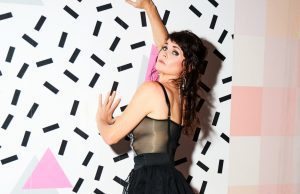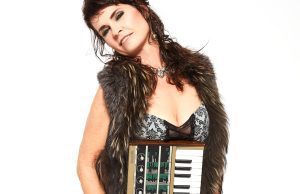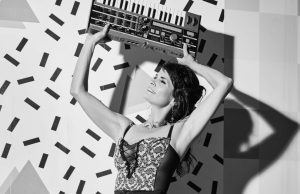Pride Month Profile: Oakland Producer noaccordion Discusses New Album
Known for amplifying extraordinary voices, Oakland-based producer and recording artist Onah Indigo aka noaccordion is a a multi-instrumentalist, who defies the limitations of genre by introducing club beats to underground MC’s or freaky variations on mainstream key patterns to techno and drum ‘n’ bass. Originally influenced by the wave of electronic music that swept Europe in the early 90’s, claiming her own sound became the top goal for this eclectic artist. Exploring a variety of sounds from samba to jazz, internationally-known influences have infiltrated her beats while introducing her music to festival goers from all over the world. Onah has performed as noaccordion at California’s Lightning in a Bottle Festival (20k capacity venue) and Symbiosis Gathering (10k), Nevada’s famous Burning Man Festival (60k+) as well as well-known venues like San Francisco’s Regency Ballroom, The Bently Reserve, The Mint and Public Works.

Past collaborations include Evan Fraser of Dirtwire, SkipWicked of Indubious, Eenor of Les Claypool’s Frog Brigade, Stephen Suchan of Soohan and many more. Onah’s music has been playlisted on over 50+ Spotify playlists and she has received high local praise by Oakland Magazine. By channeling music’s internal pulse, the noaccordion project has transcended limitations and has even broken its own rules in the name of creativity: “I call my project noaccordion for a reason. People have strong reactions to the instrument. Most people love it; it often reminds them of their cultural past. But some people can’t stand it. It’s a particular sound, designed to be played outdoors and loudly,” she says. “I may not play it a few years from now. It may not appear in my repertoire. I don’t want to be defined by it.”
We sat down with the Oakland-based producer to discuss her latest project “Curious Soul” and what being queer means to her:
1) Congratulations on the release of your new album!! What are you hoping fans take away from “Curious Soul”?
I hope they will come away with a unique sound experience. I hope they will be curious to check out our entire back catalog. I hope they will discover new artists they have never heard of before. I hope the lyrical messages sink deep into their souls and empower them to take action for what they believe in. I hope it will encourage them to freely express themselves and embrace the beauty of diversity around them. I hope they find peace, inspiration and joy. I hope they find Allyship. I hope they find love and compassion.

2) As a queer artist in the Bay Area, what are some ways in which you see your community thriving? And by contrast, what do you wish you could see more of?
I see the Bay Area as a safe haven for queer people. It wasn’t until I moved to the Bay Area 13 years ago that I was able to tap into my extended queer family. Every night of the week there’s some type of queer event. The scene is vibrant, social and diverse. Oakland is especially supportive of queer females. Despite such an amazing scene we are still very segregated by race, gender and age. Racism, misogyny, elitism, and ageism are all present in the queer community. I hope that we get better at addressing these issues. I hope we find more love, compassion and understanding as we move forward. I hope we find more ways to unite to tackle these larger systemic challenges together.
3) Your new project takes listeners on a sonic exploration. How did your identity influence the project?
Being queer defines me as someone who is outside the norm of society. Someone who does things differently, oddly, queerly. I would say that I also embody this characteristic when it comes to music. I do not follow the trends. I do my own thing. I’m not trying to be popular. I just want to be able to fully express myself. Queerness shines through also via two collaborators on this album, Aima The Dreamer and Grvity. Their lyrics speak to their own queer experiences and self reflections. Queer images also appear in my graphics and in an animated music video for “Smile Revolution” featuring Aima The Dreamer. Watch rainbows, mermaids, dancing women and pulsing hearts tell a story of finding joy and peace.

4) Who are some of your biggest musical influences and why?
Bjork:
She’s an eccentric, cutting edge, female, electronic music producer and performance artist.
Missy Elliott:
She’s a queer, fierce, feminist, female, hip-hop music producer, who is not afraid of any man and fully embodied in her power and sexuality
Lily Allen:
She’s a female singer songwriter from the UK, whose lyrics are funny, candid and insightful. She was told by her voice instructor she would never make it but she carried on regardless.
5) What does the word queer mean to you?
Queer means the freedom to be myself. I love the word because it encompasses all sexual orientations outside the straight binary. I grew up in the 80s amongst rampant homophobia and an AIDS crisis. As a bisexual during that time my identity was not accepted by either the gay or straight world. Both worlds told me I was confused and I had to choose whether I was straight or gay. This put me in a difficult place and made me feel torn apart. I’m so grateful that my identity is now being acknowledged as valid and that the gay and lesbian communities now include all queer identities under one term.
6) Where do you hope to see yourself and your career in music in 5 years? 10?
I see myself based in Oakland California operating a purpose built music recording studio. I see myself working with cutting edge, local artists, focusing on women, people of color and queers. I see myself organizing a yearly event that showcases this talent. I see myself scoring the music for a groundbreaking film coming out of Oakland. I see myself mentoring local female music producers.










